#jewish chapel
Note
wait, sorry you don’t support the student protests happening across the country?
I’ve never said that and neither did the post I assume led you to send this ask. What I don’t support is students using a foreign conflict with an extremely complex history that they have no connection to as an excuse to cosplay as revolutionaries and attack vulnerable minorities on their own campuses.
I support the cause of Palestinian liberation. I also support the general existence of the state of Israel and a peaceful two-state solution to conflict in the region, recognizing that we don’t live in a fantasy world and a country that has existed for 70+ years cannot simply cease to exist. I do not support violence perpetrated by Hamas or by the Israeli government. I support protests that are based in genuine advocacy and not antisemitism. All of these things are positions that can coexist.
I also used to be a college student. And I was a college student at a school where there was a Students for Justice in Palestine organization with a sizable student membership. And do you want to know the things that organization did on my campus?
They promoted antisemitic speakers, including those who engaged in Holocaust Denial. A main student leader in the org regularly engaged in Holocaust Denial. They “protested” the very existence of Jewish student organizations and events that those organizations put on despite there being zero connection to Israel. When Jewish students made complaints about antisemitism, they were accused of being racist. This list is just a handful of the awful antisemitic behavior that I observed during that period.
Tldr; in my experience, student activism on very liberal college campuses about I/P has very little to do with I/P or the actual cause of Palestinian liberation, and a lot to do with students finding a socially acceptable excuse to be wildly antisemitic while pretending that they’re not. And you’re going to have a really hard time convincing me that the current wave of protests, including the ones at Columbia referenced by that post, during which “protesters” have told Jewish students things like “go back to Europe” and have called on Hamas to murder Jewish students, are anything different.
#chapel talks#I have avoided posting much about this lately because people on this hellsite don’t believe in nuance but you came into my house so#but your lack of reading comprehension is not my problem#if you can explain how telling AMERICAN jewish students to go back to europe isn’t blatant antisemitism then you can try again to come at m#but you can’t! so please fuck off
22 notes
·
View notes
Text
I love that Byleth’s last name is Eisner. Like absolutely in a crest obsessed society the little guy that loves fishing and beetles and doesn’t talk much has a normal last name in a world full of Bergilez and Blaiddyd and Hresvelg. They are absolutely just some guy!
#Also I love the fact that Eisner is a Jewish last name#and Byleth doesn’t pray in the Seirosian chapel#but instead makes offerings to the pagan alter in abyss#byleth eisner#fire emblem three houses#fire emblem three hopes
23 notes
·
View notes
Text
am I about to become a Leonard cohen girlie?
2 notes
·
View notes
Text
What to watch on YouTube right now – Part 16 (Holy Week Special)
Welcome back, my readers, YouTube viewers and all others who followed this series of articles focused on YouTube videos worth watching.
For this edition, I am doing the Holy Week Special. Today is Good Friday and I have prepared for all of you a selection of YouTube videos about God, His Son Lord Jesus and the nation of Israel where the holy sites are. The videos are all sourced from the…

View On WordPress
#faithful#Abraham#AMPC#Amplified Bible Classic Edition (AMPC)#Ascension#Be the fearless and aggressive church of Lord Jesus#Bible#bible lesson#Bible prophecy#bible scripture#bible studies#Bible Study#bible teaching#biblical ties between Jews and Christians#bless the Jewish people#blessing from God#blessings from God#blessings from Jesus#Blog#blogger#blogging#Blood of Jesus#Book of 1 Timothy#Book of Genesis#Book of John#Book of Luke#Book of Mark#Book of Numbers#Carlo Carrasco#Chapel of Ascension
0 notes
Text
Paradise Lost: How John Milton's 1667 work influenced "Hazbin Hotel"
I've been thinking about why the "fruit of knowledge" in Hazbin Hotel is depicted as an apple, as opposed to another fruit that would've been more accurate to the Middle East during the Fall of Man, as well as how Paradise Lost by John Milton (1667) influenced the show.
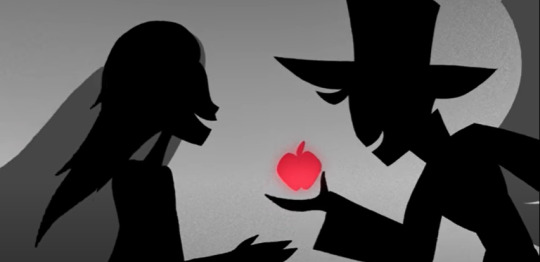
Per one source:
"Because the Hebrew Bible describes the forbidden fruit only as 'peri', the term for general fruit, no one knows [what exactly type of fruit it was]. It could be a fruit that doesn't exist anymore. Historians have speculated it may have been any one of these fruits: pomegranate, mango, fig, grapes, etrog or citron, carob, pear, quince, or mushroom."
Per Wikipedia:
"The pseudepigraphic Book of Enoch describes the tree of knowledge: 'It was like a species of the Tamarind tree, bearing fruit which resembled grapes extremely fine; and its fragrance extended to a considerable distance. I exclaimed, How beautiful is this tree, and how delightful is its appearance!' (1 Enoch 31:4)."
In Jewish and Islamic traditions, the "fruit of knowledge" is commonly identified with grapes. The Zohar explains that Noah attempted (but failed) to rectify the sin of Adam by using grape wine for holy purposes. Today, the "Noah grape" is still used to make white wine.

Furthermore:
"The association of the pomegranate with knowledge of the underworld as provided in the Ancient Greek legend of Hades and Persephone may also have given rise to an association with knowledge of the 'otherworld', tying-in with knowledge that is forbidden to mortals. It is also believed Hades offered Persephone a pomegranate to force her to stay with him in the underworld for 6 months of the year. Hades is the Greek god of the underworld, and the Bible states that whoever eats the forbidden fruit shall die."
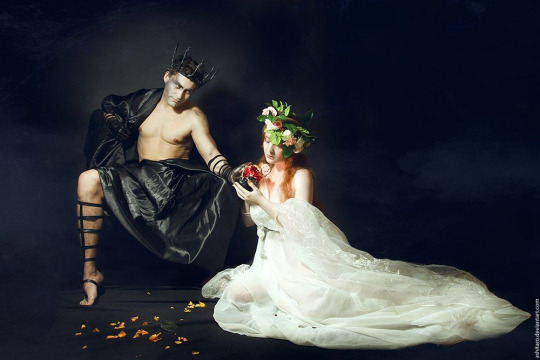
So, how then did the apple become the foremost symbol of the "fruit of knowledge"? You can partly thank Paradise Lost by English poet John Milton, a work which the lore of Hazbin Hotel is based off of.
Milton published the book in 1667, a time when the hedonistic Restoration era was in full swing. The exiled King Charles II was restored to the throne as King of England in 1660, and was a party animal, with dozens of mistresses, and nicknamed both the "playboy prince" and "Old Rowley", the latter after his favorite lustful stallion.
However, the association of the "fruit of knowledge" began with a Latin pun long before Milton immortalized the association in Paradise Lost. Per the linked article above by Nina Martyris for NPR:
"In order to explain, we have to go all the way back to the fourth century A.D., when Pope Damasus ordered his leading scholar of scripture, Jerome, to translate the Hebrew Bible into Latin. Jerome's path-breaking, 15-year project, which resulted in the canonical 'Vulgate', used the Latin spoken by the common man. As it turned out, the Latin words for evil and apple are the same: 'malus'.
[...] When Jerome was translating the 'Tree of the Knowledge of Good and Evil', the word 'malus' snaked in. A brilliant but controversial theologian, Jerome was known for his hot temper, but he obviously also had a rather cool sense of humor.
'Jerome had several options,' says Robert Appelbaum, a professor of English literature at Sweden's Uppsala University. 'But he hit upon the idea of translating 'peri' as 'malus', which in Latin has two very different meanings. As an adjective, 'malus' means 'bad' or 'evil'. As a noun it seems to mean an apple, in our own sense of the word, coming from the very common tree now known officially as the 'Malus pumila'. So Jerome came up with a very good pun.'
The story doesn't end there. 'To complicate things even more,' says Appelbaum, 'the word 'malus' in Jerome's time, and for a long time after, could refer to any fleshy seed-bearing fruit. A pear was a kind of 'malus'. So was the fig, the peach, and so forth.'
Which explains why Michelangelo's Sistine Chapel fresco features a serpent coiled around a fig tree. But the apple began to dominate Fall artworks in Europe after the German artist Albrecht Dürer's famous 1504 engraving depicted the First Couple counterpoised beside an apple tree. It became a template for future artists such as Lucas Cranach the Elder, whose luminous Adam and Eve painting is hung with apples that glow like rubies.
Milton, then, was only following cultural tradition. But he was a renowned Cambridge intellectual fluent in Latin, Greek and Hebrew, who served as secretary for foreign tongues to Oliver Cromwell during the Commonwealth. If anyone was aware of the 'malus' pun, it would be him, and yet he chose to run it with it. Why?
Appelbaum says that Milton's use of the term 'apple' was ambiguous. 'Even in Milton's time the word had two meanings: either what was our common apple, or, again, any fleshy seed-bearing fruit. Milton probably had in mind an ambiguously named object with a variety of connotations as well as denotations, most but not all of them associating the idea of the apple with a kind of innocence, though also with a kind of intoxication, since hard apple cider was a common English drink.'
It was only later readers of Milton, says Appelbaum, who thought of 'apple' as 'apple', and not any seed-bearing fruit. For them, the forbidden fruit became synonymous with the 'malus pumila'. As a widely read canonical work, 'Paradise Lost' was influential in cementing the role of apple in the Fall of Man story."
To tie this back into John Milton's relationship with King Charles II of England, as mentioned, Milton originally served Oliver Cromwell, Lord Protector of England, and the English Commonwealth, which was formed with the overthrow and execution of King Charles I on 30 January 1649, following the bloody English Civil War (1642 – 1651).
The King's two sons - the newly-christened King Charles II, the elder, and James, Duke of York (King James II), the younger - fled into exile on the European continent. However, with the death of Oliver Cromwell on 3 September 1658 came the 2-year-long dissolution of the English Commonwealth, and the restoration of the monarchy.
As for Milton himself, we can look to an article by Bill Potter.
Milton, born on 9 December 1608, was around 51-52 years old when King Charles II was restored to the throne. He attended Christ's Church, Cambridge in his youth, and mastered at least six languages, as well as history and philosophy; making him, perhaps, the most knowledgeable poet in history. He spent more than a year travelling across Europe, conversing with and learning from intellectuals, linguists, poets, and artists, including the famous Galileo Galilei.
However, Milton was a controversial figure of his time, being unafraid to criticize institutions of authority; arguing that "divorce was Biblical", for which he was routinely condemned; joining the Puritans; penning the Areopagitica, a treatise on liberty in favor of Parliament and the Roundhead rebels, during the reign of King Charles I, arguing that the King must be held accountable by the people; and agreed with and justified the murder of King Charles I, for which Parliament hired him in 1649 as a propagandist and correspondence secretary to foreign powers, on account of his fiery manifestos against "the man".
The collapse of the Commonwealth with the death of Oliver Cromwell in 1658 did not deter Milton from continued political writing against the monarchy and the new public sentiment that brought about its Restoration under King Charles II in 1660. On the contrary, Milton - now totally blind, having lost his eyesight by the age of 44 in 1652, a decade earlier - began writing Paradise Lost in 1661, and spent the next six years dictating the work to transcribers.
A supporter of regicide, Milton was also forced into exile himself, and faked his own death, as Charles refused to pardon - and sought to execute - any of those directly involved with his father's murder. Milton's friends held a mock funeral for Milton on 27 August 1660, just months after the coronation of King Charles II on 23 April 1660.
King Charles II commented that he "applauded his [Milton's] policy in escaping the punishment of death [execution for treason] by a reasonable show of dying", but insisted on a public spectacle nonetheless by having Milton's writings burned by the public hangman.
After eventually obtaining a general pardon from King Charles II, Milton was imprisoned, and released, likely due to political friends in high places. He died, aged 64, in 1674. His theological views were sometimes considered heterodox by the best Puritans, and his political views came close to getting him executed on several occasions. His poetry, however, has endured as some of the greatest works in the English language, especially Paradise Lost; much of his greatest work was written during his 22 years of complete blindness.
One of the main factors in King Charles II deciding to grant a pardon to Milton was, ironically, Paradise Lost. While originally written by Milton as a scathing criticism of King Charles II and the monarchy - depicting Lucifer Morningstar as a sympathetic rebel against God, with King Charles II claiming that is right to rule came from "divine ordainment" - Charles II enjoyed the work, and authorized its publication on 20 August 1667. We know this because a 1668 copy of Paradise Lost in royal bindings by Samuel Mearne, bound lovingly in a fine red leather made of goat skins tanned with sumac, and stamped in gold with the royal cypher of King Charles II, was found. The endpapers bore a watermark with the royal arms of Charles II.
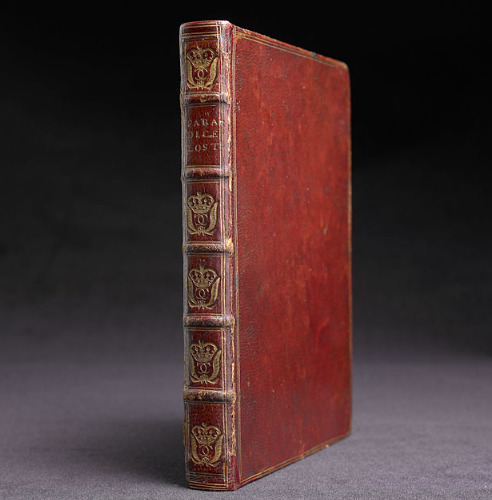
Per one Miltonian scholar: "The most single important event in Milton's life was the event against which he struggled most: the Restoration of Charles II, [and his relationship with the King]. Had it not come, we might have never had Paradise Lost...certainly, we should never have had [it] in [its] present power and significance."
Milton followed up Paradise Lost with Paradise Regained in 1671, three years before his death, with advice for King Charles II, urging the hedonistic Charles to "reign over himself and his passions":
"For therein stands the office of a King, His Honour, Vertue, Merit and chief Praise, That for the Publick all this weight he bears. Yet he who reigns within himself, and rules Passions, Desires, and Fears, is more a King; Which every wise and vertuous man attains: And who attains not, ill aspires to rule Cities of men, or head-strong Multitudes, Subject himself to Anarchy within, Or lawless passions in him which he serves." - John Milton, Paradise Regained, Book II, lines 463-472
To summarize: "If we must have a King back again, my Lord, please try to be a good man, unlike your father, who fell to his pride, [which was also the downfall of Lucifer]."
To quote another source: "Though the passage begins by noting that the office of a King is to bear the weight of public concerns, it is the control of one's private concerns that truly set a King apart as a virtuous character. Indeed, so important is self-command that any wise or virtuous man who attains it is like a king; any king who does not practice [self-command] is nothing more than a mere subject, ruled by anarchy and lawlessness."
Milton's words, too, echo a work written by Charles' grandfather, King James VI/I of Scotland and England: Basilikon Doron ("Royal Gift").
Per Wikipedia:
"'Basilikon Doron' (Βασιλικὸν Δῶρον) means 'royal gift' in Ancient Greek, and was written in the form of a private letter to James' eldest son, Henry, Duke of Rothesay (1594–1612). After Henry's death, James gave it to his second son, Charles, born 1600, later King Charles I. Seven copies were printed in Edinburgh in 1599, and it was republished in London in 1603, when it sold in the thousands.
This document is separated into three books, serving as general guidelines to follow to be an efficient monarch. The first describes a king's duty towards God as a Christian. The second focuses on the roles and responsibilities in office. The third concerns proper behaviour in daily life.
As the first part is concerned with being a good Christian, James instructed his son to love and respect God as well as to fear Him. Furthermore, it is essential to carefully study the Scripture (the Bible) and especially specific books in both the Old and New Testaments. Lastly, he must pray often and always be thankful for what God has given him.
In the second book, James encouraged his son to be a good king, as opposed to a tyrant, by establishing and executing laws as well as governing with justice and equality, such as by boosting the economy. The final portion of the Basilikon Doron focuses on the daily life of a monarch.
All of these guidelines composed an underlying code of conduct to be followed by all monarchs and heads of state to rule and govern efficiently. James assembled these directions as a result of his own experience and upbringing. He, therefore, offered the 'Basilikon Doron' ('Royal Gift') to his son, with the hope of rendering him a capable ruler, and perhaps to pass it down to future generations.
Overall, it repeats the argument for the divine right of kings, as set out in 'The True Law of Free Monarchies', which was also written by James. It warns against 'Papists' (Roman Catholics) and derides Puritans, in keeping with his philosophy of following a 'middle path', which is also reflected in the preface to the 1611 King James Bible. It also advocates removing the Apocrypha from the Bible."
King James VI/I further instructed his son and grandson:
"A good monarch must be well acquainted with his subjects, and so it would be wise to visit each of the kingdoms every three years."
"During war or armed conflict, he should choose old-but-good captains to lead an army of young and agile soldiers."
"In the court and the household, [a royal] should carefully select loyal gentlemen and servants to surround him. When the time came to choose a wife, it would be best if she were of the same religion and had a generous estate. However, she must not meddle with governmental politics, but perform her domestic duties."
"As for inheritance, to ensure stability, the kingdom should be left to the eldest son, not divided among all children."
"Lastly, it is most important...that [a royal] would know well his own craft...to properly govern over his subjects. To do so, [one] must study the laws of the kingdom, and actively participate in the council. Furthermore, [one] must be acquainted with mathematics for military purposes, and world history for foreign policy."
"[A royal] must also not drink and sleep excessively. His wardrobe should always be clean and proper, and he must never let his hair and nails grow long. In his writing and speech, he should use honest and plain language."
King James VI/I further supplemented Basilikon Doron with a written treatise titled The True Law of Free Monarchies: Or, The Reciprocal and Mutual Duty Between a Free King and His Natural Subjects.
"It is believed King James VI/I wrote the tract to set forth his idea of absolutist monarchism in clear contrast to the contractarian views espoused by, among others, James' tutor George Buchanan (in 'De Jure Regni apud Scotos'), [which] held the idea that monarchs rule in accordance of some sort of social contract with their people. James saw the divine right of kings as an extension of the apostolic succession, as both not being subjected by humanly laws."
Milton's own Areopagitica was a follow-up on De Jure Regni apid Scotos by George Buchanan, and also to The True Law of Free Monarchies, as well as the idea of the "divine right of kings". It takes its title in part from Areopagitikos (Greek: Ἀρεοπαγιτικός), a speech written by Athenian orator Isocrates in the 4th century BC.
Most importantly, Milton also wrote on the concept of free will: "Milton's ideas were ahead of his time in the sense that he anticipated the arguments of later advocates of freedom of the press by relating the concept of free will, and choice to individual expression and right."
The concept of free will, too, was a major topic explored in Paradise Lost. Per one source: "In 'Paradise Lost', Milton argues that though God foresaw the Fall of Man, he still didn't influence Adam and Eve's free will. [...] God specifically says that he gives his creatures the option to serve or disobey, as he wants obedience that is freely given [or chosen], not forced. Some critics have claimed that the God of the poem undercuts his own arguments; however, Milton did not believe in the Calvinistic idea of 'predestination' (that God has already decided who is going to Hell and who to Heaven), but he often comes close to describing a Calvinistic God. God purposefully lets Lucifer (Satan) escape Hell, and sneak past Uriel into the Garden of Eden, and basically orchestrates the whole situation so that humanity can be easily ruined by a single disobedient act. In describing the Fall of Man before it happens, God already predicts how he will remedy it, and give greater glory to himself by sending his Son [Jesus Christ] to die, and restore the order of Heaven."
In Hazbin Hotel, Adam also describes the Calvinistic idea of 'predestination', and that "the rules are black and white":

However, "This possible predestination leads to the theory of the 'fortunate fall', which is based on Adam's delight at learning of the eventual coming of the Messiah [from his bloodline]. This idea says that God allowed the Fall of Man, so that he could bring good out of it, possibly more good than would have occurred without the Fall, and be able to show his love and power through the incarnation of his Son. In this way, the free will of Adam and Eve (and Lucifer/Satan) remains basically free, but still fits into God's overarching plan."
However, there is one major flaw with this, and that is that we don't know if Jesus Christ exists within the Hazbin Hotel universe or not. Yet Charlie Morningstar, the daughter of Lucifer Morningstar and Lilith, and the "Princess of Hell", is depicted as a savior-esque figure within the show who, like God in Paradise Lost, encourages lowly sinners to choose obedience to God out of their own free will. More interestingly, Charlie does not come from Adam's bloodline; yet, while Lucifer decries 'free will', Charlie supports 'free will' instead.
Perhaps is is merely because Charlie, being the daughter of Lucifer and Lilith, claims to want to fulfill Lilith's "dream" of humanity being empowered in Hell ("The mind is its own place, it can make Heaven out of Hell, or Hell out of Heaven" - Lucifer, Paradise Lost); however, I think it also stems from Charlie having a genuine belief that 'free will', and people choosing to do good instead of evil, is "good" and "Godly".
True to Paradise Lost, this is also in fulfillment of God's plan; and, according to one fanfiction, why God allowed Charlie to be born to Lucifer and Lilith, so that sinners may be redeemed through Charlie.
For more on differing interpretations of 'free will', I suggest reading: "Free Will and the Diminishing Importance of God's Will: A Study of Paradise Lost and Supernatural" by Kimberly Batchelor (2016)
Excerpt: "'Paradise Lost' –and Milton’s purpose for writing the poem— is rooted deeply in postreformation Arminianism and this is apparent in its employment of free will. Chapter 1 argues that Milton turns to free will as a tool to justify the actions of God. Freedom of choice is God-given, and sets up a morality in which right and wrong are dictated by God. Chapter 2 shows that in 'Supernatural', free will is not given by a higher power; and, in fact, free choice functions as an act of defiance against God's will."
This raises the question: Is 'free will' given by God, using Lucifer as his vessel, in Hazbin Hotel, as in Paradise Lost? Or is 'free will' not given by a higher power; and, in fact, an act of defiance against God?
This brings us back around to our first question: Why is an apple, or 'malus', used to depict the "fruit of knowledge", especially if 'malus' means 'bad or evil', whereas Milton depicts 'free will' as God-given?
Well, for one, Lucifer still chooses to associate himself with apple symbolism and imagery, despite being skeptical of free will:


Based on the introduction to Episode 1, Charlie also views 'free will' as a gift (Miltonian), whereas Lucifer appears to view it as a curse.
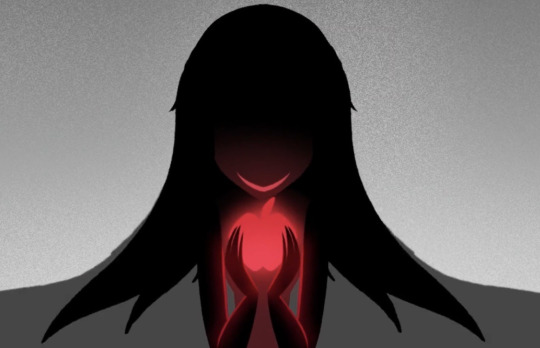
However, Charlie also notes that it was through the 'gift' of free will that the "root of all evil" entered the world, for if mankind could choose to be good, then they could also choose to be evil ('malus').
John Milton states in Paradise Lost: "Of Man's First Disobedience, and the Fruit Of that Forbidden Tree [malus], whose mortal taste Brought Death (evil, malus) into the World, and all our woe."
Thus, the use of an apple specifically is likely a tie-in to what others have been speculating about a character that series creator Vivienne Medrano (Vivziepop) alluded to a while back: "The Root of All Evil".
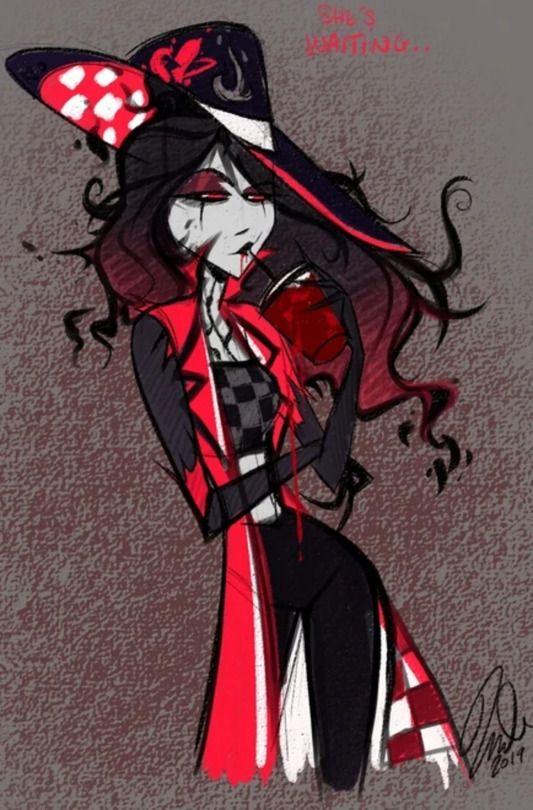
However, "Roo" itself is depicted as possessing the body of a human woman, presumably Eve, the first one to eat the "fruit of knowledge":

Thus, we can discern that "Malus" likely refers to this character. (Also see: "Maleficent", a name that also uses the root word "mal", "evil".) As for Roo's intentions, if Charlie is "good" - and, if, in fact, Alastor was sent by "Roo" (Eve) - then they may want for Alastor to work on their behalf to "corrupt" Charlie, or make sure the hotel never succeeds.
This is because demonic power is tied to human souls, and there are "millions of souls" in Hell, which likely fuels the great power of "Roo". The more souls there are in Hell, the more powerful "Roo" becomes. The Overlords also get their demonic power from "millions of souls".

The deal between Eve and "Roo" might even be the first contract, or deal, between a human soul and a demonic entity; in exchange for 'free will', and the knowledge of good and evil, Eve allowed the "Root of All Evil" to inhabit her body, and to escape the void or prison it was confined to by Heaven (Hell?). (For one cannot be 'all-good' unless you attempt to 'eliminate' or 'ablate' evil; and, in Greek mythology, Zeus imprisoned the Titans in Tartarus for all of their evil deeds.)
Another possibility, brought up in an article by Gillian Osborne, is that Lucifer sees the "fruit of knowledge" as an apple, but it may appear as different fruits to different people, depending on how they view it. This also fits with Lucifer and angels being able to easily shapeshift.
In Paradise Lost, only Lucifer describes the fruit as an "apple" (malus), as he associates malus with "bad, evil", while the narrator also describes the fruit as "a mix of different colors" and peach-like. This then begs the question: "Did the fruit of knowledge of good and evil become 'evil' because Eve harbored resentment towards Adam?"
Quote: "Lucifer (Satan) gives Eve yet another hint that this tree may be more complicated than he wishes her to believe: although elsewhere in Milton's poem Eden is heady with its own newness, sprouting spring flowers left and right, the tree of knowledge is already old: its trunk is 'mossie'. Nevertheless, Lucifer claims to wind himself around the tree 'soon'; the quickness of his reported arrival stands in contrast to the timescales required to cover a fruit tree with moss (PL 9.589). Placing Lucifer's winding body between these two timescales—an easeful present and the inhuman scale of natural history—Milton suggests that there is something dangerous in entangling the past with the present. Yet, 'Paradise Lost' also makes deep biblical history feel like present politics for its readers. When Adam and Eve wander out of Eden at the end of the poem, they famously make their way not only into an earthly paradise, but also into the present. Eden's mossy apple tree therefore represents the pitfalls of conflating nature and history, of seeing any action in human history—even Eve's eating of an apple—as natural, if by nature, we mean inevitability. For Milton, history, unlike nature, is directed by humans, progressive, and, like the reading of 'Paradise Lost', hard work. While trees may inevitably collect moss the longer they live, Adam and Eve's labors in the garden, and our labors of reading, require agency and effort. Milton's poem refuses mourning the loss of Eden, [and the perfection of Heaven], in favor of a perpetual, melancholic, recreation of paradise: a present perfecting."
To quote Twisted: The Untold Story of a Royal Vizier, which also draws inspiration from John Milton's Paradise Lost: "It's an unfortunate situation...but you do have a choice [i.e. free will]."
#hazbin hotel#hazbin hotel analysis#hazbin#hazbin analysis#hazbin hotel meta#hazbin meta#hazbin hotel theory#hazbin theory#deep thoughts#john milton#paradise lost#eve hazbin hotel#lucifer hazbin hotel#lucifer morningstar#adam hazbin hotel#lilith hazbin hotel#lilith morningstar#roo hazbin hotel#root of all evil
217 notes
·
View notes
Note
Dear Mr. Gaiman, I saw your Wired interview on mythology support on YouTube, and I would like to ask a question regarding mythological studies if I may: being a British white man as you are, is it okay to study Christianity's mythologies like it's a set of story elements that can be treated as decorationa of commerical products like video games, comic books and novels, or is Christianity something that cannot be toyed with with a light attitude for a Westerner? I'm East Asian myself (my first language is Mandarin and my family is Buddhist) and in East Asia mythological elements are talked about like material to be used in video game design or storytelling, and I know that that can be troubling for the truly Christian communities. So basically what I'd like to ask you is your view on the propiety of using biblical references in commercial fiction or products, especially with regards to taboos like the names of demons, which is often seen in Japanese video games and popular media. Is it okay to view such usage as harmless to the audience such as children or teens?
Good question. I don't know. I was a Jewish kid who was a scholarship kid at a Church of England school, the kind with chapel services every morning, so I was more familiar with High Church Protestant songs and services than with Jewish ones. I was top of the class, always, in religious studies, even though for me they were all just more mythology.
I suspect that my attitude was "if I have to learn this then it's mine to use". If they didn't want me to use it, they were free not to teach it to me.
When Terry Pratchett and I wrote Good Omens, we put a lot of Christianity into it, with me being the one that had actually read the Revelation of St John of Patmos, and made notes on what we needed to include. Good Omens began as humorous look at The Omen, which was itself a mass market film about the coming of the Christian End Times, so we felt one of us needed to have read it for research. Good Omens was also inspired by a particularly antisemitic moment in The Jew of Malta, John le Carre's spy novels and most of all by Richmal Crompton's William books.
I would need a deep dive into what you mean by "harmless" before I could hazard a guess as to whether it was that or not and whether fiction should be harmless or not.
989 notes
·
View notes
Text
I love how everyone is like "oh my god you Jews are so mean you cancelled Kanye!" when he literally just got his twitter account back and now because of his actions more and more celebrities and regular people are feeling empowered to publically express antisemitism and violence towards Jews. Kanye is fine, trust me.
We don't want Kanye "cancelled". We want Jews to be safe, which has not yet been accomplished.
It speaks volumes that you care more about your favourite celebrities than the lives and wellbeing of Jewish people.
I've seen people who never ever expressed any sort of favour towards Kanye West that are now suddenly jumping to defend him.
I've seen queer people who publically called out Dave Chapelle for his transphobia, who are now silent about his antisemitism.
I've seen people who will wax poetic about Donald Trump's transphobia, misogyny, etc etc, but say nothing about his antisemitism.
I've seen white queer people center themselves on issues like Charlottesville and Marjorie Taylor Greene and everything in between, and say nothing about antisemitism.
I've seen leftists practically recite the Protocals of the Elders of Zion and then claim to be "allies" even though we know you want us dead.
We see you. Us Jews see your complacency. We see your silence. We see you rushing to defend antisemites. We see you.
#antisemitism#media antisemitism#leftist antisemitism#fandom antisemitism#current events#right wing antisemitism
2K notes
·
View notes
Text

Raphaël (Raffaello Sanzio) (Italian, 1483-1520)
The Miraculous Draught of Fishes for the Sistine Chapel, ca.1515-16
This Cartoon depicts one of the founding moments of Christianity – when the Jewish fisherman Simon, later renamed Peter, is called to be an apostle (or disciple) of Jesus Christ (Luke 5:1-11).
Simon, wearing a blue tunic, is kneeling before Christ. He has been fishing unsuccessfully on the Lake of Gennesaret in the Sea of Galilee. Jesus tells him to cast his nets into deep water, which produces such a large catch that the boat overflows with fish. Simon exclaims that he is unworthy of such a miracle. Jesus raises his hand in blessing and replies, "Fear not; from henceforth thou shalt catch men", announcing the role that Simon would now have in helping to spread the Christian faith.
#christian art#advent calendar#renaissance#italian art#italy#italian#the miraculous draught of fishes#1500s#art#fine art#european art#classical art#europe#european#mediterranean#southern europe#christian#Christianity#christentum#catholic#catholic art#catholicism#oil painting#fine arts#europa#raphael#raffaello sanzio#western civilization
80 notes
·
View notes
Text
by Matt Lebovic
“[Harvard] contributed to Nazi Germany’s efforts to improve its image in the West,” wrote historian Stephen Norwood in his book, “The Third Reich in the Ivory Tower: Complicity and Conflict on American Campuses.”
“Harvard’s administration and many of its student leaders offered important encouragement to the Hitler regime, as it intensified its persecution of Jews and expanded its military strength,” Norwood wrote.
Conant “was not just silent” about antisemitism, said Norwood, but “actively collaborated in it.”
In May 1934, Conant was publicly mute during the visit of the Nazi warship Karlsruhe to Boston, some of whose crew members were entertained at Harvard.
The next year, Conant permitted Nazi Germany’s top diplomat in Boston to place a wreath bearing the swastika in a Harvard chapel, according to Norwood.
Throughout the 1930s, Harvard tried to keep out Jewish refugees — and especially Jewish professors — as demonstrated in research on European scholars who attempted to flee Hitler.
Conant did not speak out against Nazism until after the Kristallnacht pogrom in November 1938. Three years had passed since the Nuremberg race laws stripped German Jews of citizenship.
67 notes
·
View notes
Text
Revs. Jan Barnes and Krista Taves have logged hundreds of hours standing outside abortion clinics across Missouri and Illinois, going back to the mid-1980s. But unlike other clergy members around the country, they never pleaded with patients to turn back.
The sight of the two women in clerical collars holding up messages of love and support for people terminating a pregnancy “so infuriated the anti-abortion protesters that they would heap abuse on us and it drew the abuse away from the women,” recalled Taves, a minister at Eliot Unitarian Chapel in Kirkwood, Missouri, as she sat on a couch at Barnes’ stately church in this quiet suburb of St. Louis.
“I thought: ‘Whoa, these people really are not messing around.’ But then I thought, ‘Well, I’m not messing around either.’”
So when Missouri’s abortion ban took effect after the Supreme Court overturned Roe v. Wade last year, Barnes and Taves decided to fight back. Along with rabbis and ministers across several denominations, they joined a first-of-its-kind lawsuit arguing Missouri blurred the line between church and state, imposed a particular Christian idea of when life begins over the beliefs of other denominations, and threatened their ability to practice their religions.
As the nation nears the one year anniversary of the fall of Roe, the Missouri case is one of nearly a dozen challenges to abortion restrictions filed by clergy members and practitioners of everything from Judaism to Satanism that are now making their way through state and federal courts — a strategy that aims to restore access to the procedure and chip away at the assumption that all religious people oppose abortion.
In fact, many of the lawsuits are wielding religious protection laws enacted by anti-abortion state officials to target those officials’ own restrictions on the procedure.
In Indiana, a group of Jewish, Muslim and other religious plaintiffs sued over the state’s near-total abortion ban. Their argument: that it violates the Religious Freedom Restoration Act signed into law in 2015 by then-Gov. Mike Pence. A lower court judge sided with them in December and blocked the state’s ban from taking effect — the most significant win the religious challengers have notched so far.
Then, earlier this month, the Indiana judge granted the challengers class action status, meaning a win for them could apply to anyone in the state whose religion supports abortion access in cases prohibited by state law.
“Even if the Religious Freedom law was intended by Mike Pence to discriminate against people, we thought: ‘Let’s use this for good instead,’” said Amalia Shifriss, a leader of Hoosier Jews for Choice, one of the Indiana plaintiffs. “It brings me joy to think how much this must upset him.”
A Pence spokesperson characterized the lawsuit as a “pursuit to legalize abortion up to and even after birth.” They added: “It will probably strike Americans as pretty tasteless to call the latest iteration of their abortion crusade as a cause ‘for good’ and a source of ‘joy.’”
Conservatives with a history of mounting their own religious challenges to state laws dismiss the effort as doomed to fail, arguing that even if people can prove the abortion bans violate their beliefs, it won’t be enough to halt enforcement.
“As Justice Ruth Bader Ginsburg explained in one Free Exercise case, the right to swing your arm ends just where the other man’s nose begins,” said Denise Harle, senior counsel with Alliance Defending Freedom, a conservative legal group that has filed briefs defending state abortion restrictions, including from faith-based challenges in Wyoming and Florida. “Even if you have religious freedom, there is a line at which you are doing actual deadly harm and destroying human life, so it’s appropriate to limit what can be done in the name of religion.”
But with oral arguments and rulings in several of the cases expected this summer and fall, other legal experts say there’s a solid chance the challengers can persuade courts to grant religious exemptions to abortion bans if not strike them down altogether.
Shlomo C. Pill, a lecturer at the Emory University School of Law who specializes in religious rights, said the lawsuits have “a strong basis and should be successful,” particularly after a series of COVID-19-related cases paved the way for more religious exemptions. Pill pointed to multiple Supreme Court decisions during the pandemic that said whenever states create secular exemptions to laws — like indoor gathering restrictions or vaccine mandates — they have to justify not offering religious exemptions as well.
“So the fact that secularly-motivated exemptions to abortion bans exist — such as for rape and incest — means the legislature could also have to offer similar exemptions for people with religious objections,” he said.
‘REAL CHUTZPA’
Most of the cases, including those in Indiana, Kentucky, and Texas, are demanding exemptions from the bans for people whose religions support abortion rights. But a few, including the lawsuits in Florida, Missouri and Wyoming, are attempting to have the bans struck down entirely.
In Missouri, the plaintiffs argue that because lawmakers put religious language in the text of the abortion ban itself and made explicit religious appeals when voting on it, they violated the Establishment Clause.
“It took real chutzpah for the legislators to voice their own religious motivations, to wantonly and shamelessly purport to know what God wants or doesn’t want and to enshrine that into law,” said Rabbi James Bennett of Congregation Shaare Emeth in St. Louis, another plaintiff in the Missouri lawsuit. “They’re entitled to their interpretation of when life begins, but they’re not entitled to have the exclusive one.”
Last week, the group faced off in a St. Louis courtroom with state officials who are pushing to have the case thrown out. A ruling could come as soon as this summer.
In Florida, clergy representing Reform Judaism, Buddhism, the Episcopal Church, the United Church of Christ and the Unitarian Universalist Church sued in state court both to overturn the state’s 15-week abortion ban, and — if that fails — to secure religious exemptions. Their case makes free speech arguments as well — claiming that state bans on “aiding and abetting” abortions are muzzling clergy members who want to offer counseling to parishioners grappling with whether to terminate a pregnancy.
In Kentucky, three Jewish women are arguing that the state’s near-total abortion ban violates their belief that life only begins when a baby takes its first breath, saying it’s preventing them from pursuing pregnancy through in-vitro fertilization.
“To have someone else’s religious belief that an embryo is a human being imposed on me in a way that’s so personal, that prevents me from growing my family, is just rude and un-American,” Lisa Berlow, the lead plaintiff in that case, said in an interview. Berlow had one child through IVF and was planning to have another before Dobbs made her and her fellow plaintiffs fear prosecution. “Discarding non-viable embryos could now be criminalized, or I could miscarry and not know what type of medical care I would get or whether I would be investigated for causing the miscarriage,” she said.
The Satanic Temple is in federal court challenging abortion bans in Texas, Idaho and Indiana, arguing that the laws infringe upon their congregants’ belief in bodily autonomy and right to practice abortion as a religious ritual. A Texas District Court ruled against the Satanists last fall, saying they didn’t prove the need for a temporary restraining order blocking enforcement of the ban against its members. The 5th U.S. Circuit Court of Appeals is poised to rule on the challenge in the coming weeks.
These cases are unlikely to restore abortion rights at the federal level given the weaker religious rights protections in the U.S. Constitution compared to many state constitutions as well as the federal judiciary’s rightward tilt.
Elizabeth Reiner Platt, director of the Law, Rights, and Religion Project at Columbia Law School, stressed that the Supreme Court has a record of protecting the religious rights of some groups and not others, pointing to its back-to-back decisions in 2017 upholding the right of a Christian baker to refuse to bake a cake for a same-sex wedding and allowing the right of the Trump administration to deny entry to travelers from majority-Muslim countries.
“While I don’t like to read the tea leaves, I don’t have any hope that the current Supreme Court would, after ruling that there was no due process right or privacy right to abortion, would find a right under the Free Exercise Clause or the Establishment Clause,” Platt said.
Still, she and other legal experts see the state-level religious challenges as one of the best chances abortion-rights advocates have to chip away at bans on the procedure.
“The arguments are quite powerful for creating religious exemptions in the reproductive context under First Amendment doctrine and under state laws for Free Exercise,” said Micah Schwartzman, director of the Karsh Center for Law and Democracy at the University of Virginia Law School. “What Judges do with them is another story.”
In order to succeed, these lawsuits must prove: that the right to an abortion is central to the religious practices of the people suing; that they are sincere in their beliefs and have a track record of observing them; and that state abortion bans make it impossible for them to live according to their faith.
The cases challenging abortion restrictions in their entirety face an additional hurdle: proving that state officials stepped over the line separating church and state in crafting the bans.
“We have a really strong Establishment Clause argument because it’s clear that these bills were passed for religious reasons,” said Marci Hamilton, a professor of constitutional law at the University of Pennsylvania who is part of the legal team representing clergy in Florida. “The 15-week bill was signed in a church and members of the state legislature repeatedly referred to God when arguing why this had to be done.”
Other experts are skeptical, however, of the strength of these arguments.
“There are a million-and-one other explanations a state could give for their abortion restrictions,” Pill said. “They could argue it’s a matter of secular conscience, for example. And once you have any kind of secular justification, an Establishment Clause argument becomes more difficult.”
For their part, the states defending their abortion laws and the conservative legal groups supporting them have to prove that they have a compelling interest — unrelated to religion — in protecting fetal life, that they’re using the least restrictive means to protect that interest, and that the challengers’ claims are speculative and premature because none of them have actually sought an abortion or been blocked from obtaining one since the laws took effect.
“I think these are much more like political stunts than they are viable court cases,” said Lori Windham, a vice president and senior counsel at the Becket Fund, the legal firm behind the Hobby Lobby case that secured a Supreme Court ruling allowing many employers to opt out of covering certain forms of birth control for their workers due to a religious objection. “You can have a sincere political belief or policy preference, and it can be passionate and deeply held, but that doesn’t make it a religious practice.”
CITING SCRIPTURE
Judges have historically avoided questioning the sincerity of someone’s religious beliefs, but Becket and other groups have filed amicus briefs that do so.
To combat these accusations, the challengers point to scripture that lays out a case for abortion rights as well as support from religious leaders for their claims.
The Jewish challengers in Kentucky cite religious texts including the Mishnah that say life begins when a baby takes its first breath, not when it is conceived, and if medical issues arise during pregnancy, the pregnant person’s life “comes before the life of [the child].” They also submitted to the court letters from rabbis arguing that current state exemptions for life-threatening medical emergencies aren’t enough, saying Jewish law permits, and in some cases requires, an abortion when there is “a risk of poverty, abuse, addiction, or mental illness.”
The case challenging Missouri’s ban cites the United Church of Christ’s vote in 1971 to acknowledge the right to abortion and members’ “autonomy to determine what happens to their own bodies,” as well as the Episcopal Church’s “long-standing opposition” to any government attempt to infringe on reproductive choices.
“There’s a tendency to see these cases as kind of a clever, legal switcheroo. Like, here’s a way to take these laws that are often thought of as very conservative and use them to protect abortion rights,” Platt said. “But the idea of reproductive rights as a religious liberty issue is absolutely not something that came from lawyers. It’s how faith communities themselves have been talking about their approach to reproductive rights for literally decades.”
#us politics#news#politico#2023#abortions#abortion bans#reproductive rights#reproductive health#Missouri#Indiana#Religious Freedom Restoration Act#mike pence#Hoosier Jews for Choice#Alliance Defending Freedom#free exercise clause#religious exemptions#Kentucky#Texas#Florida#Wyoming#Establishment Clause#us constitution#in-vitro fertilization#Judaism#Episcopal Church#United Church of Christ#Unitarian Universalist Church#organized religion#religious freedom#the satanic temple
100 notes
·
View notes
Text
Anyway I just saw a post saying that the protests here in the US are “taking away attention” from what’s actually happening in Gaza and “LARPing oppression” as if 1) the whole point of the protests is to put attention on Gaza and call for a ceasefire and 1.5) shows they’re exclusively getting their news from mainstream cable networks and 2) it’s not the fuckin media’s fault they’re more interested in covering protests than the actual genocide, and 3) the students are somehow not facing oppression ???????
For one, what’s the solution here? Tell these students who feel very strongly (and rightfully so!) about this issue to just give up and go home? Who exactly does that benefit? Oh, right, the universities who are benefiting from this genocide, as well as the federal government. Good plan.
For two, I realize that the university at the center of this is an Ivy League school, and that the students who are there are privileged in many ways. However, that does not change the fact they are facing violence from the university and from police. That does not change the fact many of these students are Palestinian, Jewish, or other minorities. Beyond that, Columbia is not the only school where protests are happening. Emerson, USC, Yale, Harvard, MIT, Tufts, Cal Poly Humboldt, NYU, Vanderbilt, Brown, University of Michigan, UC Berkeley, Emory, Indiana University, Purdue, George Washington University, UCLA, Northeastern, Ohio State, UT Austin, Arizona State, Washington University St Louis, Cornell, University of Pennsylvania, Stanford, University of Georgia Athens, Sonoma State, San Francisco State, Sacramento State, University of Washington, Virginia Tech, Princeton, University of Minnesota, UConn, USC, University of Illinois, University of Utah, McGill, Portland State, UNC Chapel Hill, Tulane, University of Florida Gainesville, University of Colorado Denver, Case Western Reserve, City College of New York, Rutgers, Johns Hopkins, University of Maryland College Park, Barnard College, Pomona College, DePaul, Georgetown, University of Delaware, University of Arizona, University of New Mexico, University of Wisconsin, Virginia Commonwealth University, Oberlin, UC San Diego, University of San Diego, and I’m sure many others have or are currently participating in protests. Many of these schools are not elite universities only the best of the best (or the most money) get in. For crying out loud, my ass got into Indiana University.
That begs another question as well. Yes, these students at Ivy League schools have privilege. How else would you prefer they use it? When one has privilege, it is imperative to utilize it for the benefit of those one has privilege over.
Anyway. Free Palestine. Defund the police.
“Taking away attention from what’s actually going on” this is like saying the university protests against the Vietnam War were taking away attention from what’s actually going on in Vietnam. (Which I’m realizing now was probably an actual talking point at the time, but sounds ridiculous now.)
#max says things#tori says things#do NOT clown on this post#I will shut off reblogs and block people#this is not an invitation for discourse#terfs zionists fascists etc are not welcome on my posts
17 notes
·
View notes
Text
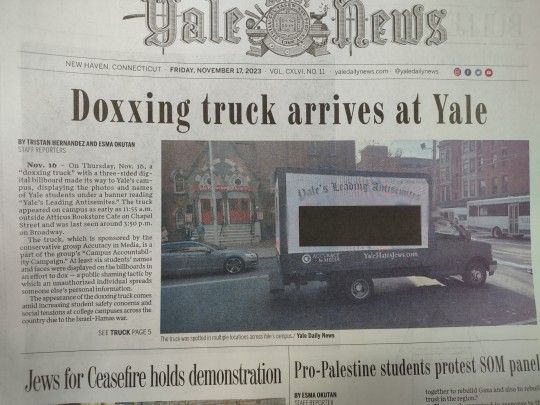
Headline title: "Doxxing truck arrives at Yale"
I'm sorry, but what the fuck.
On Thursday, Nov. 16, a “doxxing truck” with a three-sided digital billboard made its way to Yale’s campus, displaying the photos and names of Yale students under a banner reading “Yale’s Leading Antisemites.” The truck appeared on campus as early as 11:55 a.m. outside Atticus Bookstore Cafe on Chapel Street and was last seen around 3:50 p.m. on Broadway.
The truck, which is sponsored by the conservative group Accuracy in Media, is a part of the group’s “Campus Accountability Campaign.” At least six students’ names and faces were displayed on the billboards in an effort to dox — a public shaming tactic by which an unauthorized individual spreads someone else’s personal information.
The appearance of the doxxing truck comes amid increasing student safety concerns and social tensions at college campuses across the country due to the Israel-Hamas war.
“I am a Navajo and Jewish woman who is committed to liberation for all people, including my own communities,” a graduate student who appeared on the truck wrote to the News, on the condition of anonymity due to personal safety concerns. “I am proud to be Jewish, just as I am proud to be Navajo. It is deeply unsettling and violent that Jewish students are being doxxed and called antisemitic.”
[...]
40 notes
·
View notes
Text
Ellen Ioanes at Vox:
Protests over the war in Gaza erupted on Columbia University’s campus last week and have sparked demonstrations at other universities across the country. The demonstrations have resulted in some intense crackdowns and political scrutiny, all coming in the wake of recent congressional hearings on antisemitism on campus and amid an uptick in both antisemitism and anti-Muslim sentiment in the US.
Protests have emerged across the country, including at Yale University, New York University, the University of North Carolina at Chapel Hill, Miami University in Ohio, and Temple University in Philadelphia, among other campuses.
Once again, top universities have become the locus around which America litigates questions about the US’s support of Israel amid its deadly war in Gaza, free speech, antisemitism, and anti-Muslim discrimination — and a convenient target for political elites looking to make a point. For example: Lawmakers, including House Speaker Mike Johnson today, are visiting Columbia’s campus.
The protests are calling on universities to divest from firms that they contend profit from Israel’s war and occupation in Palestine, more than six months after the start of the war and as the death toll in Gaza has exceeded 34,000. Some groups at universities that conduct military research, like New York University, are also requesting their schools end work contributing to weapons development as well. At Columbia, Yale, and New York University, students have faced mass arrests as administrators seek to quell the unrest.
Pro-Palestinian and pro-Israel protests have become a prominent feature on college campuses since Hamas’s October 7 attack on Israel. They reached a fever pitch in December when the presidents of Harvard, MIT, and the University of Pennsylvania gave controversial testimony before Congress about campus antisemitism, both real and hypothetical.
Tensions reignited last week after Columbia president Nemat Shafik gave congressional testimony that, per the Associated Press, focused on “fighting antisemitism rather than protecting free speech.” Students erected tents on Columbia’s main lawn to show solidarity with Gaza. Then Shafik took the controversial step of calling in the police to arrest those involved.
That contentious decision wasn’t just jarring to Columbia students particularly because of the university’s history, but also sparked outrage among onlookers both at the site and on social media.
The controversy at Columbia and other campuses has illustrated how universities have struggled to uphold their dual commitments to free speech and protecting their students during a fraught political moment when more young people sympathize with the Palestinian cause than with the Israeli government. Concerns about antisemitism at the protests (often attributed to students, but largely perpetrated by outsiders according to anecdotal reporting) also piqued national attention; amid this all, Columbia University switched to remote learning on Monday, April 22 — which also happened to be the first day of the Jewish holiday of Passover.
[...]
There are antisemitic incidents in the United States, which represent real danger to Jewish communities and individuals — and they have increased since the Hamas attacks on October 7.
In December, the Anti-Defamation League reported that antisemitic incidents had increased by nearly 340 percent since then. Complicating its data, however, is the fact that the ADL does not always differentiate between violent antisemitic incidents like assault and anti-Zionist protests and calls in support of BDS. Removing all Israel-related incidents from their count, America has a smaller but still big problem: Non-Israel-related antisemitic incidents still rose by 65 percent compared to 2022, per their data.
Columbia students aren’t alone in facing broad accusations of antisemitism. Students at Yale, the Ohio State University, Massachusetts Institute of Technology, and others have all been called out by the ADL for engaging in Palestine solidarity protests as well as for specific incidents of antisemitism. Nor are they alone in facing arrest; NYU students and faculty and students at Yale have also been arrested.
Police involvement in the protests — particularly on New York City campuses — has been met with backlash, particularly from university faculty and activists.
[...]
What’s behind the protests?
In many ways, the demands of the protesters have been overshadowed by the controversy.
At Columbia, the protesters belong to a coalition, Columbia University Apartheid Divest (CUAD), which formed in 2016 to demand Columbia and Barnard College disclose investments in and divest — or remove from its investment portfolio — from Israeli and American companies and institutions that support Israel, citing its wars in Gaza and oppression of Palestinians in the West Bank and Jerusalem, and its illegal occupation of Palestinian territory.
The coalition’s demands are of a piece with the BDS (Boycott, Divestment, and Sanctions) movement started by Palestinian civil society groups in 2005. BDS cites as its inspiration the anti-apartheid activists of the 1980s who targeted South Africa’s apartheid government with boycotts.
While that movement wasn’t decisive in bringing down that government, it was successful in alienating the apartheid government from major global players like Barclays bank, the Olympics, and the International Cricket Conference, forcing countries and international institutions to confront their complicity in South Africa’s racist policies.
In addition to divestment from “companies profiting from Israeli apartheid,” CUAD has a list of five other demands, including a call for an immediate ceasefire from government officials including President Joe Biden, and, importantly, an end to the dual degree program that Columbia has with Tel Aviv University.
These demands echo those of student groups at other colleges and universities. NYU student activists are also demanding the university shut down its Tel Aviv campus and “divest from all corporations aiding in the genocide,” including weapons companies, and ban weapons tech research that benefits Israel.
Critics allege that BDS and anti-Zionism are at their core antisemitic, arguing that BDS delegitimizes Israel and “effectively reject[s] or ignore[s] the Jewish people’s right of self-determination, or that, if implemented, would result in the eradication of the world’s only Jewish state, are antisemitic,” according to the Anti-Defamation League.
Vox explains very well the nationwide college student protests against the Gaza Genocide and Israel Apartheid that tie in to the broader debate on antisemitism and free speech on college campsuses.
#Gaza Genocide#Gaza#Israel/Hamas War Protests#Israel/Hamas War#Ceasefire NOW#Ceasefire NOW Protests#Israel Apartheid#Colleges#Columbia University#Boycott Divest and Sanctions#Anti Zionism#Campus Protests
14 notes
·
View notes
Text
ok, now that i've watched all of tos (none of the movies yet...) i am going to do the top ten worst and best episodes, according to Me. they are as follows:
WORST EPISODES
10. the savage curtain - idk who thought putting abe lincoln in a cage match with the vulcan version of ghandi against like, ghengis khan and space hitler would be a good idea. but it wasn't. i did like seeing the vulcan father of logic though like "im gonna go sacrifice myself for peace" ok king
9. i, mudd - all of the mudd episodes are bad. he's not charming at all whatsoever. however, this one is better than the other one because uhura gets to pretend to sell out kirk and they're SOOO cute about it. her little giggle when he PICKS HER UP BY HER SHOULDERS and tells her how proud he is. PLEEEEASE
8. charlie x - the entire premise of this episode is that the bad guy is just autistic. and then they make him live on a planet without people because he can't adjust to normal life ???
7. shore leave - obvious racism of this episode aside, the faux-irish jig that played while kirk was being menaced by his extremely unfunny old bully nearly drove me over the edge. we DO love a good mccoy death fakeout tho
6. a piece of the action - if i had any interest in gangster films before this it's all gone now. that being said. i loved when kirk drove the little car. he was so bad at it. he was so happy.
5. mudd's women - like he's literally just selling women?? and the plot twist is that secretly they're ugly?????
4. who mourns for adonias - this is just "what if ALIENS build the pyramids bro" except for the 1960s. nail in the coffin for this one was kirk proudly declaring they didn't needs gods - because they already had the One God, thank you very much!
3. the paradise syndrome - WHY WOULD YOU HAVE NATIVE AMERICANS MISTAKE KIRK FOR GOD. WHY. like i know why but Why. i think the very worst part of this episode was that it had an amnesia plot that would have FUCKED if you had simply removed the people. if there hadn't been people in this it would've been in my top 10 episodes. i think this broke me.
2. the omega glory - this is the same as the last episode except there's no amnesia, and also the "native americans" are white cosplayers who worship the american flag and mistake kirk for god because he can recite the pledge of allegiance yes really. if i had a nickel for every time this happened i'd only have two nickels etc etc at least kirk didn't knock anybody up in this one ig
1. patterns of force - why would you make your two jewish leads wear swastikas and then literally be whipped by nazis. i know he's such a bad person but not even william shatner deserves that. number one worst episode everyone says it's omega glory but it's this one
BEST EPISODES
10. plato's stepchildren - this episode is hard to rank because like it's both good and bad. the torture scenes were genuinely upsetting, especially the ones at the end w/ spock & nurse chapel, because they weren't just violence being inflicted on tied up guys, but they were SUPPOSED to be upsetting, like it was literally the point. and also this episode bears the distinction of THEEE kirk & uhura kiss. literally historic.
9. the trouble with tribbles - i feel like everyone's heard of this but it really is as good as everyone says. sometimes 1960s humor doesn't translate to 2020s humor but it was genuinely hysterical start to finish. also, the distinct trilling sound was so imprinted in my brain i recognized it in the 2009 movie where i had never registered it before.
8. the naked time - aside from the KING SHIT george takei pulled with the fencing this episode also contains the "i am in control of my emotions [sobbing]" moment and kirk & spock LITERALLY having a slapfight. this episode has everything. an absolute masterpiece
7. the empath - i feel like this paired with "the world is hollow and i have touched the sky" really made me a Bones Understander. i feel a little bad about that bc everyone says the characterizations in s3, or actually that the season as a whole, is kinda shaky? but i watched without knowing that and i feel like i Get It now. also, this was the only score i went and relistened to on spotify
6. tholian web - the spock & mccoy episode ever. there's so many things to say about this from the death fakeout to kirk's little space suit but what TRULY got me was the instant and totally nonverbal agreement to lie straight to kirk's face to both preserve personal dignity and troll the shit out of him (while chekov and sulu are like also silently laughing as they listen in no less). what this episode made me realize was that it's a good thing they argue all the time and make kirk play referee because if they were on the same side kirk wouldn't stand a chance. like he'd be finished.
5. the city on the edge of forever - ok, so, this episode made me feel like i was having a mental break. the time travel. spock's little hat. when he watches kirk kiss edith and then goes back into their room to pretend he didn't see anything. mccoy and kirk basically hugging at the end when edith bites it.
4. requiem for methuselah - the first time i watched this i was kinda like :/ because how does kirk fall in love with a woman in FOUR HOURS? that aside the ending scene blew my tits clean off. i paced around my house for like 30 minutes going "what the FUCK was that" because i couldn't simply lie down and sleep after seeing it. rewatching the episode with uh. new context made me like it a little better. but even if it had been garbage the last scene shook me so thoroughly it would still need to be on this list. i'm getting wound up just thinking about it. number one most shocking tos moment.
3. the dagger of the mind - look, i understand that this episode was technically just run-of-the-mill stuff as far as everybody else is concerned but they put james t kirk in a little brainwashing machine. and the machine was shaped like a chair. and it gives people amnesia sometimes. i don't know how i'm expected to behave normally
2. this side of paradise - this is the episode where a flower jizzes on spock and gives him feelings. and look: it's really funny, and there's a lot to love about it. but the ending where kirk hurls verbal abuse at spock for a solid 92 seconds WITHOUT STOPPING followed by: spock beating the shit out of him until he gets his logic back. i have rewatched this perhaps 1,000 times at minimum. what the fuck were they doing
1. conscience of the king - this episode got me into this mess. i don't think i can elaborate further without significant self-incrimination. let's just say what happened was i thought "oh i'll just watch this one tos episode for context for the fanfiction" and one month later i'm writing fic about [redacted] [redacted] [redacted] DON'T WORRY ABOUT IT
ok, that's my list. i thought about doing honorable mentions for episodes that had scenes i liked even though the overall episode didn't make it into my top 10. but then i realized that would mean recapping basically the entire series and this post is already too long. i do have to give the pon farr episode a shoutout though because even though so much of it was offputting there was literally a titty window in kirk's shirt. like, it's the pon farr episode. ok NOW i'm done
#personal#star trek blogging#i feel like if i hadn't wanted people to dox that fic i could've been blogging about this all along#in some ways it was more fun to keep a lid on it but i will miss having a record of my live first impressions that i can relive later......#hence a list. and also a spreadsheet but i just made it for me and cathy it would be incomprehensible to the general public#if anyone wants an ACTUAL skip/watch list for tos hit me up#i'll clean up the one i have to match the spn one lol#tos lb#liz's star trek stuff#liz's meta#kinda.
37 notes
·
View notes
Text
Catholic Bat Family HC (inspired by @incomingalbatross)
This is inspired by @incomingalbatross's posts on the same subject that I absolutely adore because of all of the complexity around it (and how similar his code is to Catholic Christian teachings), and being a Catholic myself, I identify with it. Her works can be found here, here, here, here, and here (as well as a couple of asks).
Okay, here we go. First, a synopsis of the posts and asks:
Bruce was raised Catholic (and yes, Martha is Jewish, which is not the same thing as religiously Jewish). He drifted away in adolescence, but came back during his Training Abroad. He starts Confession with "I'm Batman" and added a chapel to the Manor.
Alfred is Anglican, and while he and Bruce have agreed to disagree, they strive for common ground.
Dick is "umbrella" Christian, i.e read the Bible to him, was taught pray, attended services, and was baptized, but it was never formal. When he came to the Manor, Bruce never pushed to convert because he's very sensitive to the "making a kid go against his dead parents' wishes" idea. He remained a believer, went to church w/ Bruce and Alfred, and deeply respects Bruce's faith, but he never had a deep connection with it all.
Jason, on the other hand, is FIERCELY Irish-American Catholic, has a battered rosary, and has a strong devotion to the Holy Family. He and Bruce click on this immediately, both how Bruce understands his troubles and how much Bruce wants to help him. And maybe Jason wants to become a priest? (aka Father Todd).
But then, of course, Jason dies and Bruce mourns hard. However, his faith is the only thing that keeps him sane and going. ( he prob. comes back bc of Superboy or Bat-Mite? But not solely the Pit).
Then Tim shows up, and things change again. Tim is Protestant (maybe), and so he starts debates with Bruce when things get quiet. It reminds him of Jason sometimes, and the contrast can be jarring, but it's good. Tim is also earnest about his faith, and somehow becomes church friends with Clark (who of course, is Midwestern Protestant). They probably end up converting Kon together.
Then, Jason comes back and he is angry at both Bruce and the Church because he's "struggling to reconcile what he used to believe with the tremendous, staggering injustice he's been put through and that he sees others going through." (copied from here). It is also a given that his relationship with Bruce and the Church are very intertwined. It means, though, that any progress in mending one leads to progress in the other. It all begins with Jason dipping himself in Lourdes (HEAVY symbolism there), and as it goes on, he and Bruce start to bond: helping in the field, trusting each other with territories, Bruce giving him the rosary back, going to Mass on the same church (but never speaking), etc. It's gradual, but it works.
Then Cass, Steph, and Damian comes in, and WHAM! Bruce is sent back in time, or "dies".
Dick comes into the faith fully in deeply regrets not having Bruce there with him when it happens. Damian goes along and becomes passionate in his own way. This acts like a beacon for the other siblings to come into the faith fully (except for Tim).
Jason keeps going with his journey, and eventually becomes the spiritual leader of the family (in a way).
Also, Selina starts kind of antagonistic, but thanks to a nudge from Bruce and her sister (Sister Maggie), she develops her faith independently from others
Father Brown is referenced as Bruce's spiritual adviser; Flambeau is also referenced to.
Now this leaves us with a couple of areas/characters to play around with: Tim, Steph, Cass, Duke, the Rows, Barbara, and more....
Which I will do in another post because this is way too long. Once again, go check out @incomingalbatross, she has some amazing work that goes beyond Batman (for example: Doctor Who, Dracula, Ranger's Apprentice, Catholic things in general, Psych, and more). Anyways, have a good one!!!
#catholic#bruce wayne#batfamily#dc comics#batman#jason todd#batfam#christianity#damian wayne#headcanon#tim drake#dick grayson#alfred pennyworth#father brown#hercule flambeau#selina kyle#bruce x selina#batcat#part 1#post continues in part 2#incomingalbatross
43 notes
·
View notes
Text

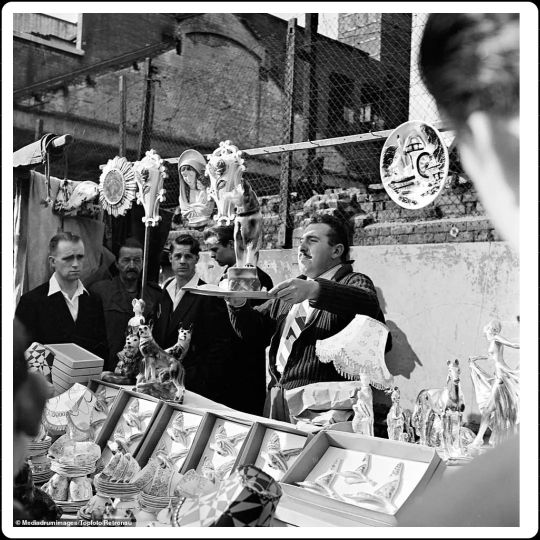
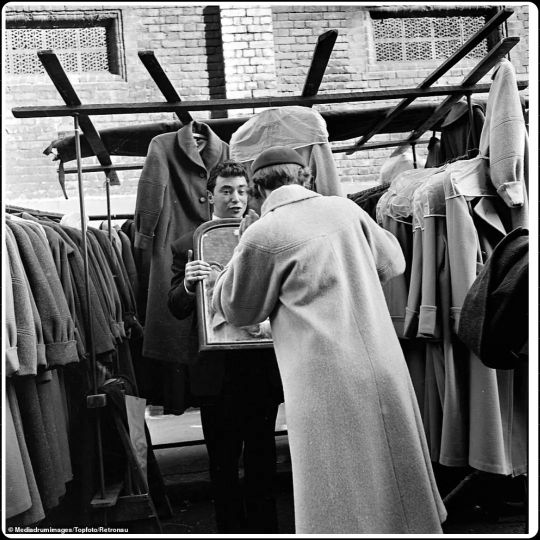

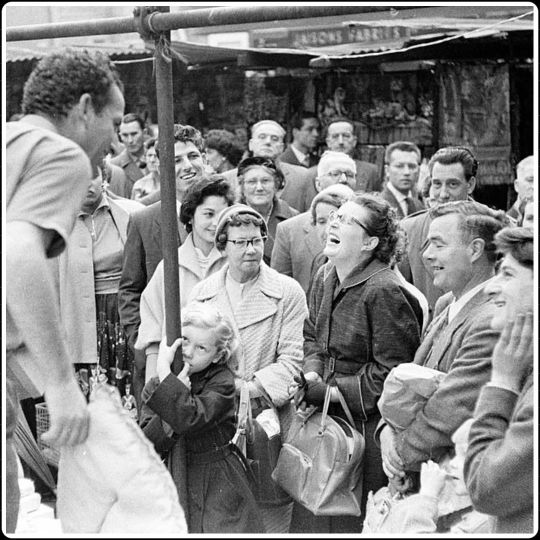


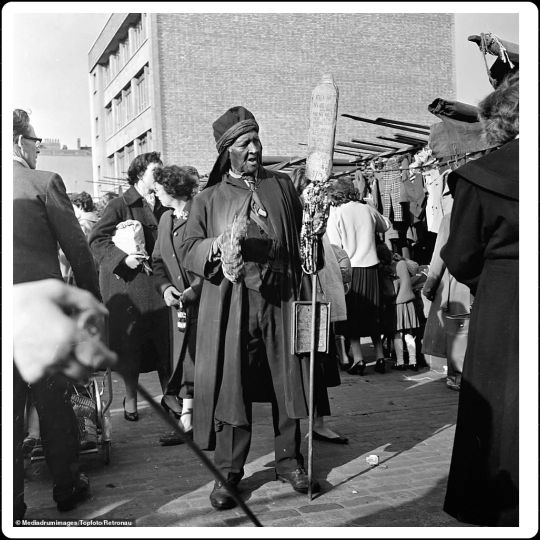
Petticoat Lane market, in the East End's Spitalfields area, in 1957.
The History part 2
From 1882, a wave of Jewish immigrants fleeing persecution in eastern Europe settled in the area. The chapels, which had previously served the Huguenot community, were adapted as synagogues. Many Jewish relief societies were founded to aid the poor. Jewish immigrants entered the local garment industry & maintained the traditions of the market. The severe damage inflicted throughout the East End during the Blitz & later bombing in World War II served to disperse the Jewish communities to new areas. The area around Middlesex Street suffered a decline, but the market continued to prosper. Beginning in the 1970s, a new wave of immigration from India & east Asia restored the area's vitality - centred on nearby Brick Lane.
In previous times the market was unpopular with the authorities, as it was largely unregulated & in some sense illegal. As recently as the 1930s, police cars & fire engines were driven down The Lane, with alarm bells ringing, to disrupt the market. The rights of the market were finally protected by Act of Parliament in 1936. As late as the 1990s, if Christmas Day fell on a Sunday (which in that decade only occurred in 1994), many of the local Jewish traders would still assert their right to open on a Sunday. 'The Lane' was always renowned for the 'patter' & showmanship of the market traders. Some, selling crockery, would pile an entire setting onto a large plate, & then send the lot, high into the air. Catching the construction on its way down was to demonstrate the skill of the vendor, & the robustness of the porcelain.
A prominent businessman, Alan Sugar, got his start as a stall holder in the market. The market remains busy & vibrant, reflecting both its immigrant history & its continuing popularity with locals & tourists.
11 notes
·
View notes